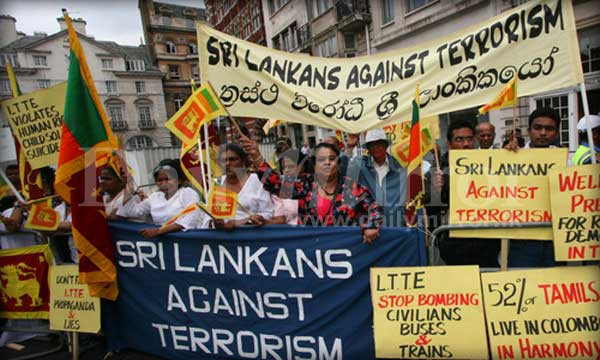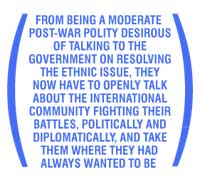Reply To:
Name - Reply Comment
Last Updated : 2024-04-27 00:00:00
 By N. Sathiya Moorthy
By N. Sathiya Moorthy
 From being a moderate post-war polity desirous of talking to the Government on resolving the ethnic issue, they now have to openly talk about the international community fighting their battles, politically and diplomatically, and take them where they had always wanted to be. The competitive nature of the internal dynamics dominating the TNA discourse lately have all elements that are inimical to a negotiated settlement that does not achieve that ‘goal’.
From being a moderate post-war polity desirous of talking to the Government on resolving the ethnic issue, they now have to openly talk about the international community fighting their battles, politically and diplomatically, and take them where they had always wanted to be. The competitive nature of the internal dynamics dominating the TNA discourse lately have all elements that are inimical to a negotiated settlement that does not achieve that ‘goal’..jpg)
_DM-recast9.jpg) All this go against their continuing demand for the re-merger of the North and the East, however,still. Elsewhere, another TNA leader, Sivajilingam, has taken exception to the Diaspora riches not going to help out their destitute brethren back home. Truth hurts, but the fact remains, like the rest of the South Asian Diaspora, the Sri Lankan Tamil groups in other countries too are not going to invest in the country, educate their brethren back home and make them employable, create jobs for the tens of thousands of Tamil war widows in the North and the East.
All this go against their continuing demand for the re-merger of the North and the East, however,still. Elsewhere, another TNA leader, Sivajilingam, has taken exception to the Diaspora riches not going to help out their destitute brethren back home. Truth hurts, but the fact remains, like the rest of the South Asian Diaspora, the Sri Lankan Tamil groups in other countries too are not going to invest in the country, educate their brethren back home and make them employable, create jobs for the tens of thousands of Tamil war widows in the North and the East.ICC Sunday, 17 June 2012 10:49 PM
Jews Diaspora support to the ISREAL. still now. ah ah ah,

Add comment
Comments will be edited (grammar, spelling and slang) and authorized at the discretion of Daily Mirror online. The website also has the right not to publish selected comments.
Reply To:
Name - Reply Comment
US authorities are currently reviewing the manifest of every cargo aboard MV
On March 26, a couple arriving from Thailand was arrested with 88 live animal
According to villagers from Naula-Moragolla out of 105 families 80 can afford
Is the situation in Sri Lanka so grim that locals harbour hope that they coul
6 minute ago
6 minute ago

6 hours ago
7 hours ago